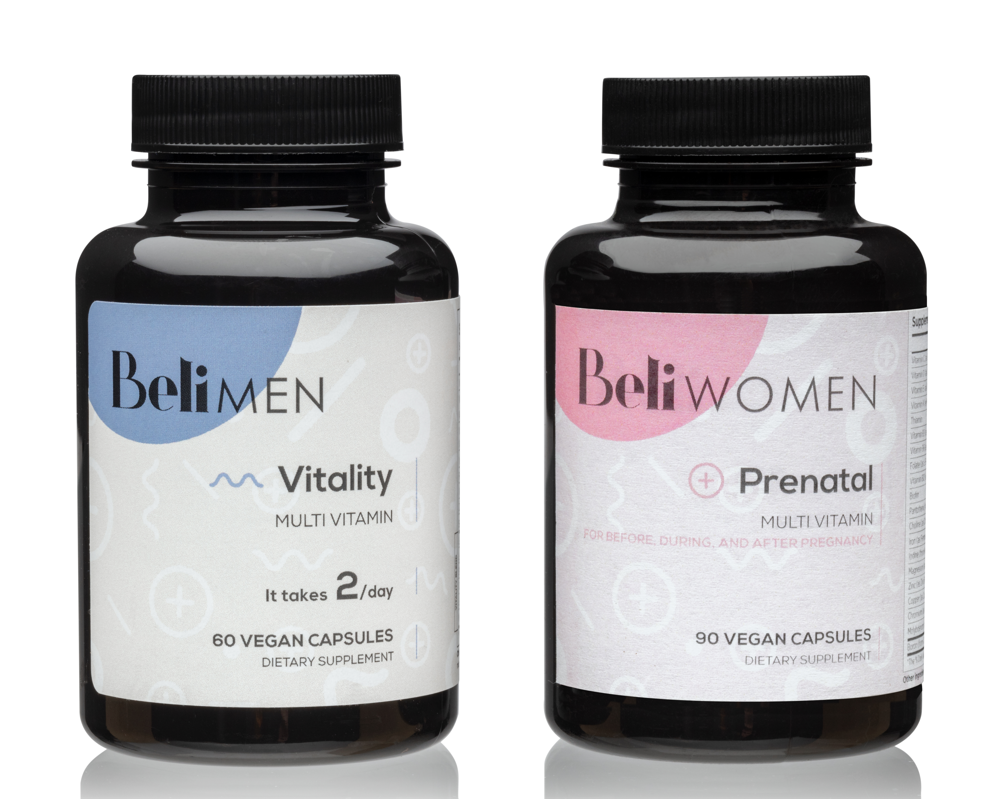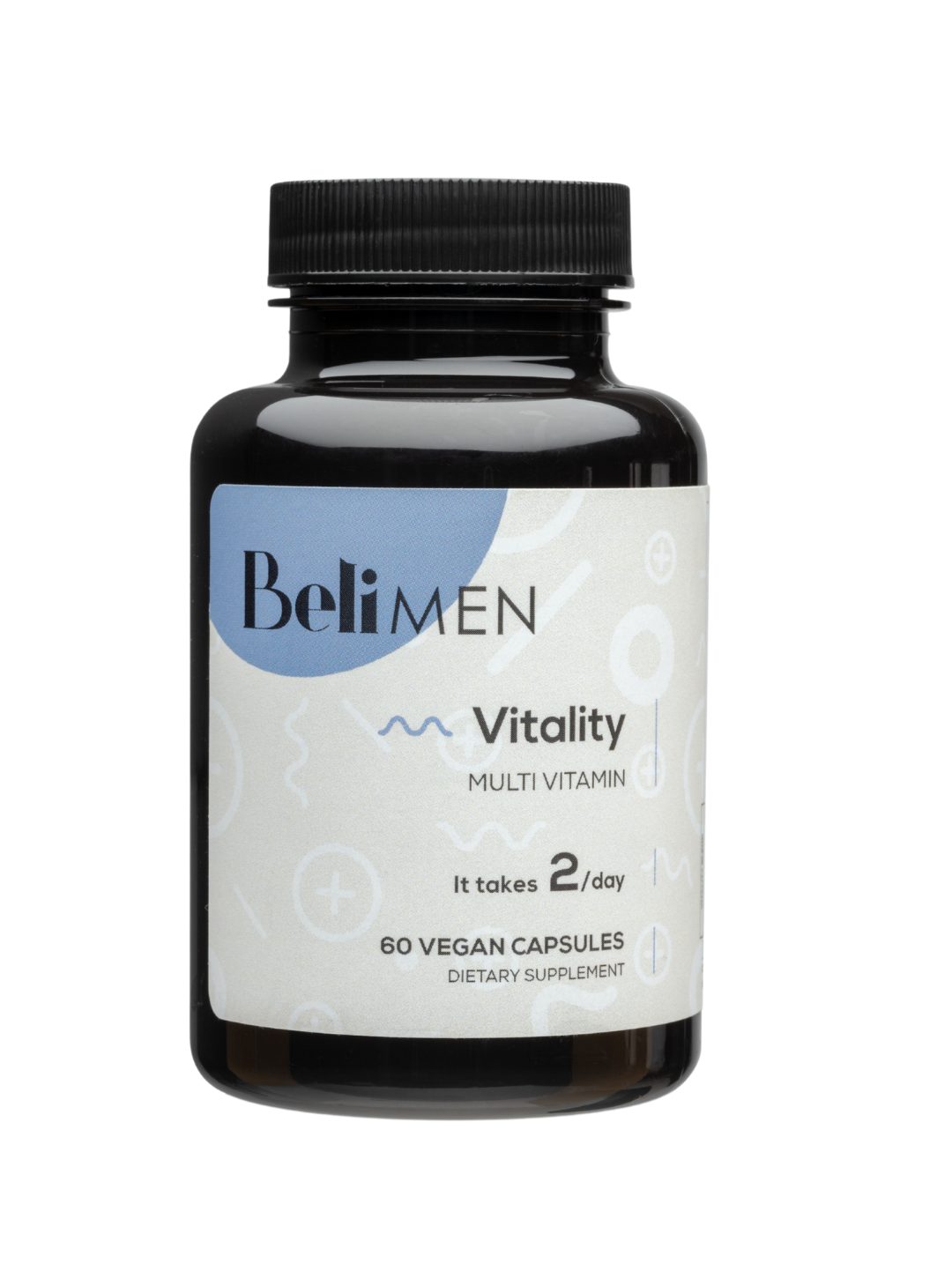Here’s the part most people never hear: sperm health is one of the most highly modifiable factors in fertility. Unlike egg reserve, which is fixed from birth, sperm are rebuilt roughly every 74 to 90 days, meaning what a man eats, how he sleeps, and the nutrients he takes today can directly influence conception potential just a few months from now.
That’s not just interesting biology, it’s a huge opportunity.
Research shows that certain nutrients, including CoQ10, L-Carnitine, Zinc, Folate, and Vitamins C, D, and E, play essential roles in supporting sperm production, motility, and DNA integrity. When paired with healthy habits like better sleep, stress management, and balanced nutrition, these vitamins can help protect sperm from oxidative stress and support overall reproductive wellness.
And it matters more than most couples realize. Male factors contribute to nearly half of all fertility challenges, while global sperm counts have declined by over 50% in the past four decades. The good news? Because sperm renew so quickly, progress can often be seen in as little as one cycle.
That’s why taking action early matters, whether you’re planning ahead or already trying to conceive. Beli Vitality for Men is formulated with clinically studied nutrients to support healthy sperm development and help couples make the most of the 90-day preconception window.
👉 Keep reading to learn how sperm health can change faster than you think — and why it’s one of the simplest, most powerful ways for both partners to prepare for pregnancy.

How Sperm Health Responds to Nutrients
Sperm cells are uniquely sensitive to lifestyle factors — from stress and diet to toxins and sleep. Antioxidants and micronutrients help defend them from oxidative stress, support normal testosterone levels, and fuel the mitochondrial “engine” that drives sperm motility.
While a balanced lifestyle is essential — healthy diet, exercise, sleep, and limited alcohol — even the best habits can leave nutritional gaps. That’s why many healthcare providers now encourage men to include a fertility-focused supplement in their preconception routine. These supplements help bridge micronutrient shortfalls and support the body’s natural reproductive processes.
What the Research Says
A 2020 Urology analysis of men’s fertility supplements found that a group of key nutrients had the strongest evidence for supporting male reproductive health: CoQ10, L-Carnitine, Zinc, Folate, Selenium, Vitamin C, Vitamin E, and Vitamin D.
Across multiple clinical studies:
-
These nutrients were associated with improvements in sperm concentration and motility.
-
Antioxidant combinations (like vitamins C, E, and Selenium) were linked to reduced oxidative stress and improved semen quality.
-
CoQ10 and L-Carnitine supported the energy production that powers sperm movement.
While no supplement can guarantee conception, the research consistently shows that targeted nutrition can promote healthy sperm function and support overall reproductive wellness.
Inside Beli Vitality for Men
Beli Vitality for Men was formulated around this evidence — combining clinically studied ingredients in doses aligned with current research and daily nutrient needs.
| Key Nutrient | Role in Men’s Health | What Research Shows |
|---|---|---|
| CoQ10 | Supports cellular energy and sperm motility | Associated with better motility and morphology in clinical trials |
| L-Carnitine | Fuels sperm movement and metabolism | Studies show improved progressive motility with consistent use |
| Zinc | Supports normal testosterone and sperm production | Low levels linked to reduced semen volume and motility |
| Folate (5-MTHF) | Aids DNA synthesis and sperm formation | Adequate levels support normal morphology and DNA stability |
| Vitamin C & E | Antioxidants that help protect sperm DNA | Linked to lower oxidative damage and improved semen quality |
| Selenium | Works with vitamin E to protect sperm membranes | Shown to support motility and vitality |
| Vitamin D3 | Plays a role in hormone balance and sperm maturation | Deficiency correlated with reduced sperm motility |
| Shilajit | Natural adaptogen studied for reproductive health | Research suggests support for normal testosterone and sperm count |
A Shared Preconception Approach
Fertility isn’t a solo effort — it’s a partnership.
When both partners focus on preconception health, outcomes tend to improve. Her prenatal supports egg quality and hormonal balance; his supports sperm production and DNA integrity. Together, they help create a stronger foundation for conception and pregnancy.
Preconception health isn’t about perfection — it’s about preparation. And taking small, science-backed steps together over 90 days can make a meaningful difference.
Lifestyle Still Matters
Even the best supplement works best alongside smart habits:
Eat nutrient-rich foods. Focus on colorful fruits, vegetables, whole grains, and omega-3s.
Move regularly. Exercise supports healthy circulation and hormone balance.
Prioritize sleep and stress management. Chronic stress and lack of sleep can affect hormone levels and sperm production.
Avoid harmful exposures. Minimize smoking, heavy drinking, and excessive heat (like hot tubs or laptops on laps).
Small, consistent changes — paired with evidence-based nutrition — can add up to a measurable difference over one sperm cycle.
The Bottom Line
Men’s health plays an equal role in conception. The good news is that sperm health is one of the few things you can actively improve, often within a matter of months.
Nutrition, lifestyle, and consistency matter — and together, they can help support a healthier, more confident start to pregnancy.
Beli Vitality for Men was created for exactly this purpose: to give men a simple, science-based way to support reproductive wellness, energy, and vitality in the months leading up to conception.
👉 Ready to Begin Your 90-Day Preconception Routine?
Start your plan with Beli Vitality for Men, a clinically informed supplement formulated for reproductive wellness, energy, and overall vitality.
Because fertility isn’t just her story, it’s yours, too.
References
-
Urology (2020). Evaluation of male fertility supplements and ingredient efficacy.
-
Showell MG et al. Antioxidants for male subfertility. Cochrane Database Syst Rev. 2020.
-
Sharma R et al. Lifestyle factors and reproductive health. Reprod Biol Endocrinol. 2013.
-
Cito G et al. The impact of carnitine supplementation on male infertility. Nutrients. 2020.
-
Thakur S et al. Purified Shilajit and testosterone levels. Andrologia. 2016.
-
Blomberg Jensen M et al. Vitamin D and male reproduction. Nat Rev Endocrinol. 2014.




